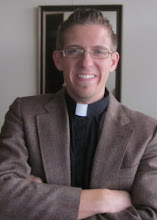What a month February has been! I have been challenged and lifted up in so many new ways. The event that continues to be processed in the back of my mind is my journey to Israel (February 7-14) and the experiences of culture conflict. Words seem to fail in my effort to describe this experience. "Life changing" just doesn't seem to have the appropiate ring to it. However, that is probably the best term that I can use to describe what the whole geography, traditions, and culture of the Holy Land have done to my thinking.
It was the three of us volunteers who decided to take this journey together. The other two were named Matt (who is up in Scottland) and Amanda (who is in a close by parish in London). Our first exposure to the "tense" atmosphere of Israel was experienced on the plane when flight attendants had to quell a fist fight between Orthodox Jews. Apparently one had been given a kosher meal and the other not. Quite scary indeed.Late that evening, we made it to the apartment of my friend Paul. Paul is a friend from college who works for the Lutheran World Federation; an organization that is really involved in education and healthcare for Palestinians. His home and work are located right on top of the Mount of Olives and overlooks the Old City of Jerusalem. Throughout the week, we became educated on the conflict between the Israeli's and the Palestinians.
Israel as a country is very young- gaining it's independence in 1948. Because of the historical treatment of the Jews, it was agreed (by the UN) that this new nation would be Jewish in origin. This was not a large change as Jews have inhabitated the land for centuries. With the fall of the Roman Empire, people of Arab and Islamic descent also settled in Jerusalem and in the areas of Palestine causing fuel for the crusades in the 13th and 14th centuries. This element also became the major problem of the present day Israel: How do you settle a land that has two peoples"claiming" it? Immediatley, the new Israeli government started to push it's "pro Jewish" policies upon the area which resulted in more conflicts. Today, having control of the entire city of Jerusalem and most of the Palestinian territory, it still seeks to put preasure on the Palestinian people.
Jerusalem is a city with two parts: the Palestinian side and the Israeli side. It is more like two cities, or perhaps a city that is trying to dominate it's other part. There are two taxi systems, two bus systems, two electric grids, and two peoples. For us living on the Palestinians side, it became very frustrating for transportation as a bus or taxi wouldn't take you somewhere, even though it was a mile away. Palestinian cars are not allowed in any part of Jerusalem. Period. In order to live in Jerusalem as a Palestinian, you have to have a special "city permit" issued by the Israeli government. Without it, you are banned from entering the city. Period. I saw this seperation first hand as I talked with a Palastinian Christian taxi driver in Bethlehem. Even though Bethlehem is only 8 miles away from the Jerusalem city boundary, he has not been to Jerusalem in over 9 years. " I would really love to celebrate Easter at my church in Jerusalem", he said. "Without a city permit, that is impossible."
The seperation continues as Israel continues to build illegal (according to international law) settlements on Palestinian lands, claiming them as bargaining tools for international treaties to aquire more land for Israel. It becomes quite simple: if you already have citizens living in the area, you are more likley to aquire that area for your country in future delegations. Thus, "Israeli Citizen Only" roads connect the Jerusalem city propper to these various settlements in the West Bank. These roads bypass the check-points that Palestinians are required to go through.
Finally, there is the Israeli "Security Wall", a wall that stretches hundreds of miles supposedly seperating Israel from the "Palestinians Terrorists". Even with a city permit, Palestinian people stand in line for hours to get to work everyday because of the Israeli policy of letting only 2 people per minute walk through that gates. Thus, one Palestinian employee who lives in Ramallah told me he has to leave his house by 3.30am to get to work by 8am everday. I can't imagine living a life like that.
For many of us, it is hard to not get angry at a particular people. We either "hate" the Palestinians for sending suicide bombers to blow up things, or we "hate" the Jewish population for illigally settling in Palestinian lands. What I have come away with as the biggest cullprit to the the Israeli/Palestinian problem is not the deep rooted land conflict, but the ease of which our societies generalize a people. Through this, we find ourselves attacking and seeing the "people" as the problem, not the greed and politics.
In our last day of the trip, Paul invited us to join him in an interview process where we drove up into Palestinian villages and talked with graduates of the Lutheran World Federation Vocational Training Center. These were people who had persevered and had graduated to start a vocation in auto mechanics, carpentry, or design. One of the young mechanics, who works on Israeli vehicles constantly and is used to seeing Israelis coming to his village summed it all up by saying, "We live along side each other in peace every day. Why do we need to let our greedy leaders tell us otherwise?" That is the question I now continue to ask.
Sunday, February 24, 2008
Subscribe to:
Post Comments (Atom)

No comments:
Post a Comment